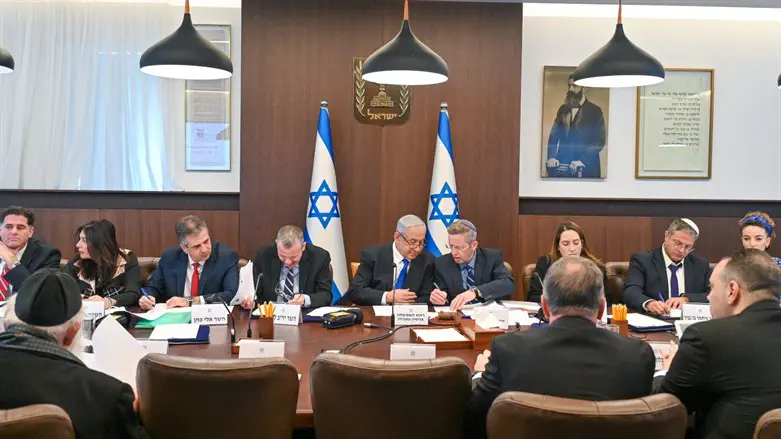
Prime Minister Benjamin Netanyahu began the weekly Cabinet meeting Sunday by addressing the government's efforts to combat the terrorism which has seen the murder of 11 Israelis in the last month in Jerusalem.
"In the face of the terrorist threat," Netanyahu said, "we are also working doubly hard against incitement." To this end, he announced the formation of a special task force to combat incitement which will be led by National Security Minister Itamar Ben-Gvir.
"I agreed at the end of the week with Minister Ben-Gvir on the establishment of a special task force to fight against the instigators of acts of murder against us. The team will be headed by the Minister of National Security. He will receive the reinforcement of investigators, police officers and lawyers, and this in full coordination with the Ministry of Justice, and with the participation of elements from the Shabak, the IDF and the National Cyber Headquarters. I wish Minister Ben-Gvir, along with all the members of the government, success in this important task.''
The team led by Ben-Gvir will include three sub-teams that operate on a daily basis and meet on a weekly basis, in order to report on the situation and make recommendations.
Children, some as young as 13, have been involved in several of the recent terrorist attacks in the capital. A 13-year-old boy shot a father and son near the City of David in Jerusalem in late January. Last week, another 13-year-old boy stabbed and murdered Border Police officer Staff Sgt. Asil Sawaed during a bus inspection at the Shuafat checkpoint. A 14-year-old boy stabbed an Israeli teenager the same day in the Old City.
Experts say that incitement and glorification of terrorists on social media led to these children's decision to commit murder, combined with incitement from terrorist groups such as Hamas, and the Palestinian Authority's media and education system.
The three sub-teams will include an investigations and prosecution team, which will be responsible for bringing charges for the crime of incitement to murder, an intelligence team, which will examine options for the improvement of collection and monitoring capabilities on social networks and to identify troubling trends before they result in a terrorist attack, and a legal team which will be responsible for examining the existing legal situation and making recommendations for providing additional legal tools to combat incitement.
The prime minister, talking about other threats to security, said that "in the face of the Iranian threat, our efforts do not stop for the simple reason that Iran's acts of aggression do not stop. Last week, Iran again attacked an oil tanker in the Persian Gulf and violated international freedom of navigation. Yesterday Iran attacked an American base in Syria. Iran continues to send deadly weapons that harm masses of innocent civilians far from its borders."
"Iran is constantly trying to harm the State of Israel and its citizens wherever they are in different parts of the world. Iran's attacks will not discourage us. We will not allow Iran to obtain nuclear weapons, and we will not allow it to establish itself on our northern border. We are doing everything and will do everything to protect our citizens, and we are reacting strongly to the attacks against us.'
Netanyahu claimed that Iran is trying to undermine the unity of the people of Israel: "Iran is trying to hurt us not only physically. It is also trying to harm our national morale. It is trying to undermine our cohesion as a people."
"I heard the words of Hezbollah, Iran's proxy in Lebanon. I heard the words of [Hezbollah leader Hassan] Nasrallah, who spoke about the demonstrations against the government and said with satisfaction: 'A civil war in Israel is approaching.' Well, I say to Nasrallah: don't bet on a civil war. It will not happen. And it won't happen because we really are brothers. This will not happen because what Nasrallah does not understand is that we live in a democracy.
"In a democracy, there are differences of opinion, there are arguments, there are sometimes agreements, and when necessary there are decisions. It won't happen and there won't be a civil war because we always remember that we fought back-to-back to protect our state and build our country.
"So on this occasion I am happy to disappoint our enemies and also to reassure our friends: Israel was and will remain a strong and vibrant democracy. An independent democracy. But precisely against the background of the expectations of our enemy, their expectations of destruction and bloodshed, we need to stop talking about blood in the streets, we need to lower the height of the flames, we need to calm the tensions. This is the clear call I am making from here, and I expect all public leaders to say these things clearly. This is what the Israeli public expects from us, and this is the clear message we need to send to our enemies," said Netanyahu.
